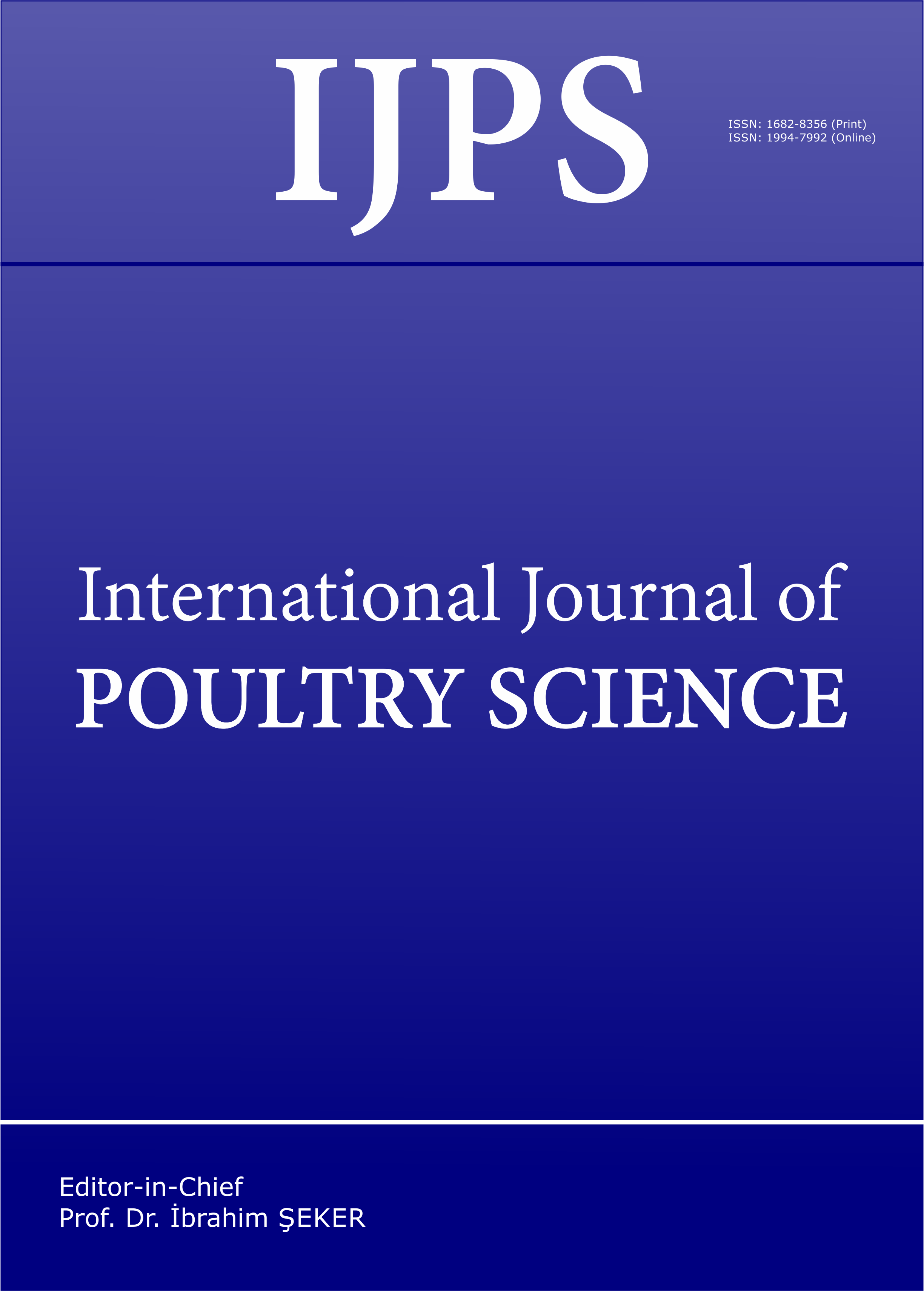Immunomodulation of Black Seed in Two Strains of Laying Hens
DOI:
https://doi.org/10.3923/ijps.2013.451.455Keywords:
Antibody titer, immune status, black seed, laying chickensAbstract
There are limited studies that investigated the effect of black seed supplementation on the immune status of laying hens. The current study investigated the effect of different levels of dietary black seed on the immune status of different strains of laying hens. A total of 600 pullets were used, 300 from Hy-Line Variety W-98 white and 300 from Hy-Line Variety brown. The white and brown pullets were divided into five groups, 60 pullets each which was divided into three replicate (n = 3), each replicate includes 20 pullets. The first group received a regular diet with no black seed (T1, control group). The second group received a diet containing 1.5% black seed from 28 wk of age until 70 weeks of age (T2). The third group received a diet containing 3.0% black seed from 28 wk of age until 70 weeks of age (T3). The fourth group received a diet containing 1.5% black seed from 16 weeks of age until 70 weeks of age (T4). The fifth group received a diet containing 3.0% black seed from 16 weeks of age until 70 weeks of age (T5). Antibody titer, cell- mediated immune response and White Blood Cell Counts (WBCs) were measured. Results showed that feeding layer chickens on 1.5 or 3.0% black seed increased the total WBCs and the difference was significant for the white hens (p<0.02). Black seed generally enhanced cell-mediated immune response and antibody titer, however, this effect was not significant. In conclusion, black seed could be used to enhance the immune status of laying chickens.
References
Mbarek, L.A., H.A. Mouse, N. Elabbadi, M. Bensalah and A. Gamouh et al., 2007. Anti-tumor properties of blackseed (Nigella sativa L.) extracts. Braz. J. Med. Biol. Res., 40: 839-847.
Al-Ankari, A.S., 2005. Immunomodulating effects of black seed and oxytetracycline in pigeons. Immunopharmacol. Immunotoxicol., 27: 515-520.
Al-Beitawi, N.A., S.S. El-Ghousein and A.H. Nofal, 2009. Replacing bacitracin methylene disalicylate by crushed Nigella sativa seeds in broiler rations and its effects on growth, blood constituents and immunity. Livestock Sci., 125: 304-307.
Ali, B.H. and G. Blunden, 2003. Pharmacological and toxicological properties of Nigella sativa. Phytother. Res., 17: 299-305.
Brennan, C.P., G.L. Hendricks, T.M. El-Sheikh and M.M. Mashaly, 2002. Melatonin and the enhancement of immune responses in immature male chickens. Poult. Sci., 81: 371-375.
Crawley, M.J., 2002. Statistical Computing: An Introduction to Data Analysis Using S-Plus. John Wiley and Sons Inc., Chichester, UK., ISBN-13: 9780471560401, Pages: 761.
Durrani, F.R., N. Chand, K. Zaka, A. Sultan, F.M. Khattak and Z. Durrani, 2007. Effect of different levels of feed added black seed (Nigella sativa L.) on the performance of broiler chicks. Pak. J. Biol. Sci., 10: 4164-4167.
Eeva, T., D. Hasselquist, A. Langefors, L. Tummeleht, M. Nikinmaa and P. Ilmonen, 2005. Pollution related effects on immune function and stress in a free-living population of pied flycatcher Ficedula hypoleuca. J. Avian Biol., 36: 405-412.
Ghosheh, O.A., A.A. Houdi and P.A. Crooks, 1999. High performance liquid chromatographic analysis of the pharmacologically active quinones and related compounds in the oil of the black seed (Nigella sativa L.). J. Pharmaceut. Biomed. Anal., 5: 757-762.
Gilani, A.H., Q. Jabeen and M.A.U. Khan, 2004. A review of medicinal uses and pharmacological activities of Nigella sativa. Pak. J. Biol. Sci., 7: 441-451.
Goto, N., H. Kodama, K. Okada and Y. Fujimoto, 1978. Suppression of phytohemagglutinin skin response in thymectomized chickens. Poult. Sci., 57: 246-250.
Guler, T., B. Dalkilic, O.N. Ertas and M. Ciftci, 2006. The effect of dietary black cumin seeds (Nigella sativa L.) on the performance of broilers. Asian-Aust. J. Anim. Sci., 19: 425-430.
Korver, D.R., E. Roura and K.C. Klasing, 1998. Effect of dietary energy level and oil source on broiler performance and response to an inflammatory challenge. Poult. Sci., 77: 1217-1227.
Martin, L.B., P. Han, J. Lewittes, J.R. Kuhlman, K.C. Klasing and M. Wikelski, 2006. Phytohemagglutinin-induced skin swelling in birds: Histological support for a classic immunoecological technique. Funct. Ecol., 20: 290-299.
Mashaly, M.M., G.L. Hendricks, M.A. Kalama, A.E. Gehad, A.O. Abbas and P.H. Patterson, 2004. Effect of heat stress on production parameters and immune responses of commercial laying hens. Poult. Sci., 83: 889-894.
Cetin, M., S. Yurtseven, T. Sengul and B. Sogut, 2008. Effect of black seed extract (Nigella sativa) on growth performance, blood parameters, oxidative stress and DNA damage of partridges. J. Appl. Anim. Res., 34: 121-125.
Shewita, R.S. and A.E. Taha, 2011. Effect of dietary supplementation of different levels of black seed (Nigella sativa L.) on growth performance, immunological, hematological and carcass parameters of broiler chicks. World Acad. Sci. Eng. Technol., 5: 304-310.
Swamy, H.V.L.N., T.K. Smith, N.A. Karrow and H.J. Boermans, 2004. Effects of feeding blends of grains naturally contaminated with Fusarium mycotoxins on growth and immunological parameters of broiler chickens. Poult. Sci., 83: 533-543.
Swamy, S.M.K. and B.K.H. Tan, 2000. Cytotoxic and immunopotentiating effects of ethanolic extract of Nigella sativa L. seeds. J. Ethnopharmacol., 70: 1-7.
Takahashi, K., T. Mashiko and Y. Akiba, 2000. Effect of dietary concentration of xylitol on growth in male broiler chicks during immunological stress. Poult. Sci., 79: 743-747.
Toghyani, M., M. Toghyani, A. Gheisari, G. Ghalamkari and M. Mohammadrezaei, 2010. Growth performance, serum biochemistry and blood hematology of broiler chicks fed different levels of black seed (Nigella sativa) and peppermint (Mentha piperita). Livest. Sci., 129: 173-178.
Worthen, D.R., O.A. Ghosheh and P.A. Crooks, 1998. The in vitro anti-tumor activity of some crude and purified components of blackseed, Nigella sativa L. Anticancer Res., 18: 1527-1532.
Yaseen, S.A., 2003. Potential antiviral activity of Nigella sativa extracts. Iraqi J. Vet. Sci., 17: 37-40.
Downloads
Published
Issue
Section
License
Copyright (c) 2013 Asian Network for Scientific Information

This work is licensed under a Creative Commons Attribution 4.0 International License.
This is an open access article distributed under the terms of the Creative Commons Attribution License, which permits unrestricted use, distribution and reproduction in any medium, provided the original author and source are credited.

